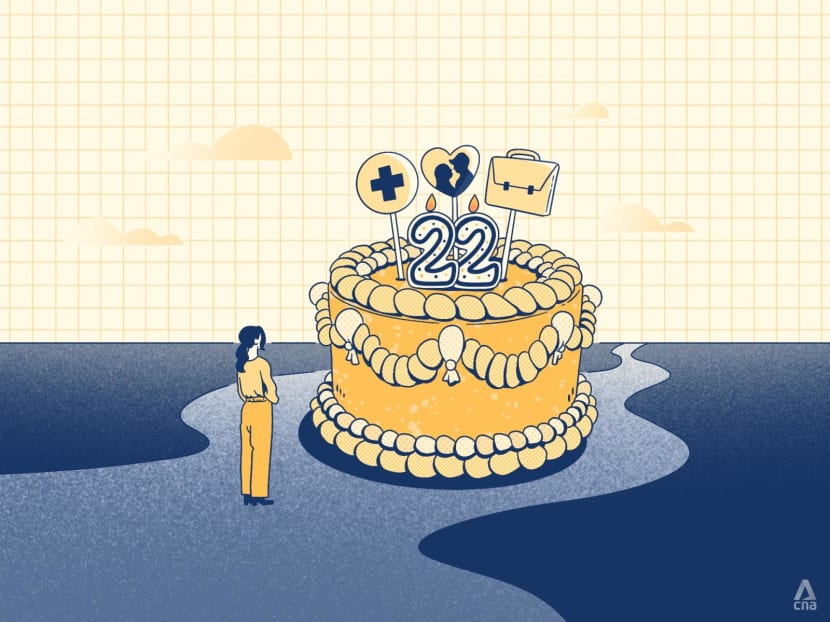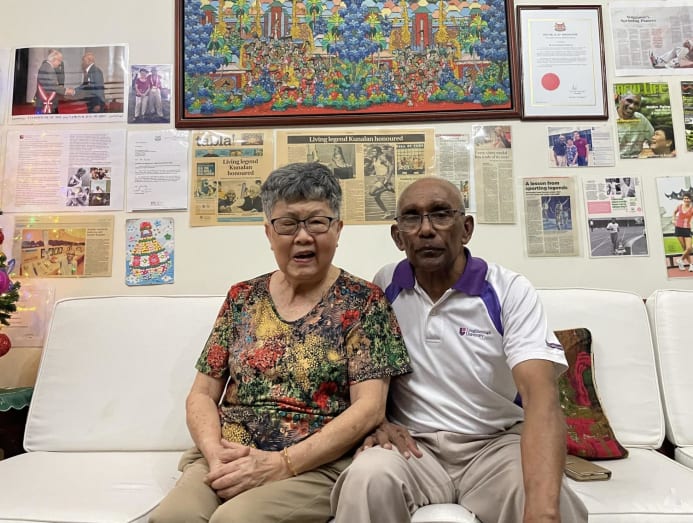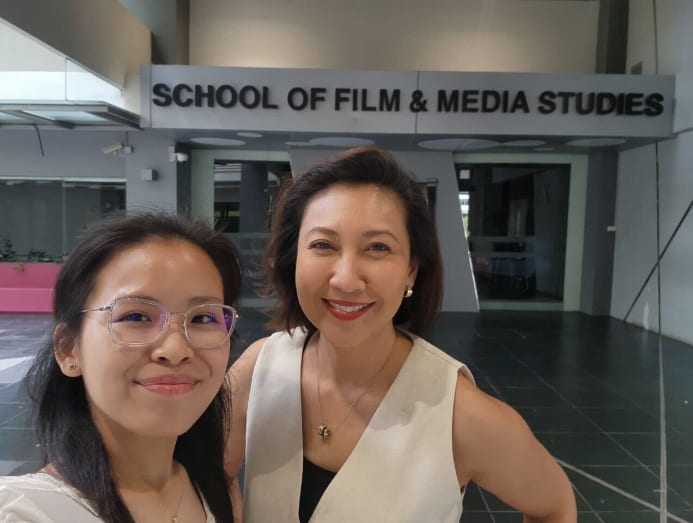About to turn 22, I asked some older Singaporeans what they had learnt on life's journey
As CNA TODAY intern Gwenneth Teo looks forward to her 22nd birthday, she decided to seek out advice from three people with varying life journeys on just how to live a rich and rewarding life.

(Illustration: CNA/Nurjannah Suhaimi)

This audio is generated by an AI tool.
Adulthood is not just one phase of life but comes in stages. Its many facets can be overwhelming, from managing finances and buying a home to achieving work-life balance and maintaining healthy relationships. In this series, CNA TODAY's journalists help readers deal with the many challenges of being an adult and learn something themselves in the process.
Mr Canagasabai Kunalan has led a fulfilling life, with a long teaching career despite a shaky academic start and a stellar athletic career that included appearances in both the 1964 and 1968 Olympics. He set a 100m Singapore national record that stood for 33 years.
Despite poor O-Level results, Mr Kunalan, now 82, was recruited as a temporary teacher to address a teacher shortage caused by the boom in births after World War II ended in 1945. In 1961, aged just 19, he began teaching Primary 3 pupils at the former Tiong Bahru School.��
As I look forward to blowing out the candles for my 22nd birthday next month, I decided to seek out advice on how to live a better life from those who are older and wiser than me. When I learnt of Mr Kunalan's life story, he seemed like a natural candidate to offer such insights.
I also spoke to Ms Noorindah Iskandar, 40, who explores self-love and relationships through her website "Shy and Curious". Funny yet candid in her articles, she was exactly the person I was seeking for a personal conversation about love.
For my third mentor on life, I returned to my polytechnic roots to chat with Ms Sharon Ismail, 50,��my ex-lecturer from Ngee Ann Polytechnic's School of Film and Media Studies. She has acted in Channel 5 television shows such as Code of Law and 128 Circle, and hosted Selamat Pagi Singapura (Good Morning Singapore) on Suria channel.
Am I cheating in life a little by learning from those who came before me? Maybe. But if it helps me lead a better life, why not?
LESSON 1: DON’T DISAPPOINT THOSE WHO BELIEVE IN YOU
Mr Kunalan fondly recalled those who supported his career, from friends who bought him spike shoes to coaches and mentors who saw his potential in both education and sports.
Whenever he could during our interview, Mr Kunalan sang the praises of his wife Chong Yoong Ying. Giving up her own promising athletics career to care for their three daughters, he said that Madam Chong has been a rock for him over the past 60 years.
With all this support from various people, Mr Kunalan said he knew he had to ensure that their backing paid off.
“If people have faith in you, don’t disappoint them. Everyone sacrificed something for me, so I worked hard to pay it back,” he added.

His comments reminded me that there are times our family and friends lift us to greater heights, and there are also moments where we need to guide those we love through difficult times.
On this theme, both Ms Noorindah and Ms Sharon recounted taking on a caregiver role when their family members were diagnosed with cancer.��
Within a six-month period in 2022, Ms Sharon's father, mother and aunt were diagnosed with cancer. Her family members took on caretaking duties while trying to balance time with their own families.
While this was unfolding, she went for a routine checkup. Her doctor told her that she was showing signs of burnout.
Ms Sharon said: "My first response was: I had no time to have burnout! I asked for evidence because I felt fine. No one in my family pointed it out to me. Every day, I did whatever I needed to do, and my family was the same.
"My doctor said my family was going through the burnout together so we couldn't see it in one another."
This was the catalyst for her to raise the issue at the next family gathering. Everyone admitted that they were exhausted.
“We were physically, mentally and emotionally drained, but we were still trying so hard to hold the fort that we forgot decompressing was a possibility.”
Since then, her family has been more forthcoming about asking for help.
I thought about this advice in my own situation as an only child. I realised that I will need to rely on relatives and friends a lot and will seek to establish a reliable support system that involves relying on one another while fostering transparency and honesty.
LESSON 2: CHERISH YOUR LOVED ONES
Ms Noorindah’s mother was diagnosed with stage four breast cancer in October 2019. Out of fear and shame, her mother hid her condition from the family and Ms Noorindah found out only a few days before she died.
After that, she was left wishing that she had gotten to know her mother more.��
The pair had a “love-hate relationship” as both were strong-willed and butted heads over Ms Noorindah’s ambitions. Ms Noorindah wanted to chase her goals and dreams, but her mother was more traditional.
Ms��Noorindah learnt to give her mother some grace, realising that her parent simply did not want her to make the same mistakes she did.

Although their relationship had its ups and downs, Ms Noorindah regrets not recognising her mother for who she was outside her role as the household matriarch.
“You have less time than you think you do with your parents. I wish I hugged my mother more. I should have recorded more photos and videos of her advice, jokes and laughter,” she said.
These insights reminded me that clashes with parents can be a regular occurrence and as young people, we can get exasperated when our elders refuse to budge. But stepping back to consider their concerns can be a way to remember that our parents are also human, flaws and all.
LESSON 3: STAY STRONG AND HEALTHY��
It may seem somewhat obvious but my mentors reminded me of the importance of looking after our bodies.
Even in his 80s, Mr Kunalan still follows his exercise routine diligently. With a combination of free-hand exercises and walks every other day, he is in the pink of health even today.
Back in his athletics career, he had learnt a hard lesson about maintaining good health and he shared with me a regret he has until this day.
Before his appearance at the 1970 �鶹��ýn Games in Bangkok, Mr Kunalan, then 28, was having some troubles with a heel spur, a bone growth on the heel.
When the gun went off for the 100m race, he lagged behind, preoccupied with thoughts of whether he should have taken the bandage off his heel.
He managed to catch up in the end, finishing third. Feeling confident, he charged forward in the 200m race, overestimating his abilities. In the first half, he led the pack and believed that the gold medal was within his grasp.
In the final stages, however, Mr Kunalan’s legs were overextended and he felt them “turning to stone”. His rivals caught up and he came away with another bronze medal, mere milliseconds behind the second-place getter.��
“I was so disappointed that I told reporters I didn’t want to have anything more to do with athletics. That was a mistake. I had so many reasons for my performance but that was what I said to the newspapers,” he told CNA TODAY.��
From that moment, Mr Kunalan did "absolutely nothing" in the athletics world for a couple of years, instead focusing on his students at��Dunearn Secondary Technical School.
He nurtured the school's track-and-field team and in 1973 and 1974, the boys' team won the national championship in their division.
The two-year break allowed Mr Kunalan's heel to heal. The 1973 SEA Games marked his return, when then-secretary general of the Singapore National Olympic Council, Mr SS Dhillon convinced him to be the final torchbearer in the opening ceremony.��
Mr Kunalan was also pulled in to replace a runner for the 4x400m race, where he eventually won a silver medal.
I did not expect his regret over those 1970 races to weigh so heavily even until today. While I’m no runner, I realise that life is like a race – where the right mindset, decisions and preparations make all the difference.
In Ms Sharon's case, her appreciation for strength training grew when she had trouble recovering from her first pregnancy. If she had known how much her body would change, the mother of two would have “trained like an athlete”, she said.
Before her second pregnancy, she turned to yoga and running and discovered that exercising made her stronger and helped her to recover quicker. Since then, she has prioritised strength training, mixing in gym sessions and various sporting activities such as Zumba and jogging.
The mental fortitude she developed in the gym has motivated and strengthened her in general.
“If I can leg press and hip thrust more than my weight, I’m convinced I can do hard things outside the gym,” Ms Sharon said.
This was all more food for thought as I contemplated my lifestyle. Turns out the gyms are not just for fitness junkies and weightlifters. Perhaps it is time to drag my lazy self to the gym so I am still healthy and sprightly at an old age.
LESSON 4: WALK YOUR OWN PATH IN LIFE
Though Ms Sharon is now a proud mother to two daughters, I was surprised to learn that she wasn’t sure about motherhood until she was pregnant.
“I thought I wasn’t maternal and had nothing to offer. I couldn’t even take care of Tamagotchi, how to raise children?” she said, referring to the digital pets played on a small egg-shaped device.
After an honest conversation with her husband who assured her that they were prepared for parenthood, Ms Sharon took the leap and now, she cannot imagine life without her daughters.
As it is often a deciding factor in relationships, I used to feel guilty for being unsure about whether I wanted to have children in the future. Ms Sharon assured me that it was completely normal to not know even when you are much older, much to my relief.
In essence, young people my age don’t need to follow a set path in life.
Youth is a whirlwind of discovering yourself, getting into relationships and convincing your parents you are ready to leave their nest, Ms Sharon said.
“Use your early 20s to explore and say 'yes' to opportunities even if you don’t have experience. Even if you hate it, know that everything has an end-date and you can always learn something about yourself. I truly believe that no learning is ever wasted,” she advised.
Despite not having any dance experience, Ms Sharon dipped her toes in ballroom dancing when she was pursuing a master's degree in theatre in London, England.
Competing in varsity circuits and performing various Latin dances helped her to overcome her fear of competitions and come to terms with losing.
The lessons she gleaned has shaped her mindset.
"Ballroom dancing was more nerve-racking than going on stage as an actor for some reason. But knowing that I was able to express myself and not care about what others think is something I carry with me today and shaped me as an actor, too," Ms Sharon said.
She stressed the importance of figuring out your ambitions, independent of parental expectations and societal benchmarks.��
Throughout her 20 years as a lecturer, Ms Sharon has observed that many of her students wanted a university degree, but could not articulate why.
“Some students said they want to please their parents. Some didn’t know what career they wanted, they just thought having a degree would solve their problems. It becomes proof that they ‘made it’,” she added.��
It is becoming increasingly normalised that there are many pathways to success, yet it can be hard to break free of others’ expectations of you.
��
I registered for university because I wanted to appease those around me. I felt I would be out of place if I did not go on with tertiary education as most of my friends were doing so.��
While I am enjoying my course of study now, stories of unhappy peers pursuing their degrees are common.
As for Mr Kunalan, though he never had a career in athletics in mind as a young man, he caught the eye of Dr Tan Eng Yoon at a football game. The late Dr Tan, a sprinter and sports pioneer himself who competed at the 1956 Olympics, encouraged the young man to train with the national athletics��team.
By the end of his 12-year athletic career, Mr Kunalan would have 20 medals, two Olympic appearances, and that 100m running record that stood for 33 years.
After retiring from running, he enjoyed a long and rich teaching career, in the latter period at the National Institute of Education, and retired in 2010.
One big take-away from my conversations with all three mentors harks back the adage that youngsters are familiar with, YOLO — you only live once.
There will always be mistakes and regrets in life, but better to make them while living the life you want, than the life that is expected of you, right? ��
Armed with these life lessons of those older and wiser than me, I look forward to trying to live the best life I can. No doubt unforeseen challenges will crop up, but if I can put these lessons into practice, I hope the older me will be proud to look back on how life has unfolded.














